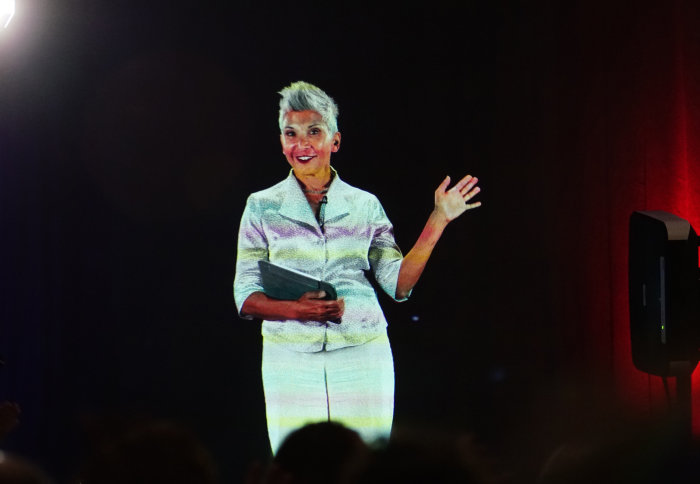Responsiveness and a long-term outlook are key to firms becoming sustainable

Professor Tima Bansal from the Ivey Business School in Canada joins a debate on sustainability via hologram
Firms who are quick to respond to the effects of climate change whilst making effective plans for the future are more likely to become sustainable.
This was the consensus of experts taking part in an event hosted by the Centre for Climate Finance and Investment at the Business School.
While some people have argued that the pressure on companies to maintain financial performance is stopping firms from tackling the effects of climate change, experts agreed that green business must be profitable to succeed.
Tima Bansal, Professor of Sustainability at the Ivey Business School in Canada, said: “Short-termism is not good for sustainability. We will never reach our goals on climate change if we are too short-term. The answer isn’t to be long-term. It’s to be both short and long-term.”
Discussions on sustainability via hologram
Professor Bansal was among several speakers who were ‘beamed in’ from Toronto, Canada using hologram technology, meaning that they appeared as 3D embodiments on a screen and were able to see and hear the audience in London.
The event was the first of its kind to use hologram technology to facilitate global conversations on sustainability, avoiding the environmental costs of transatlantic travel. It is the second time the Business School has used the hologram since Imperial became the first university in the world to deliver a live lecture using the technology in November 2018.
David Scaysbrook, Managing Partner of Quinbrook Infrastructure Partners was one of the speakers present in the London lecture theatre. He said that appetite for sustainable energy investing was rising, but the amount of capital put to this aim currently was still a drop in the ocean.
Quinbrook, which invests in lower carbon and renewable energy infrastructure, recently raised $1.6B for a new low-carbon power fund. “Capital flows are still lagging and too slow relative to the pace at which we need to move and deploy capital,” Mr Scaysbrook said. “In terms of the absolute dollars needed, the current level of institutional capital commitments is still way too low.”
He said institutional investors need to allocate more money in asset allocation terms, and governments may need to create new incentives through innovative legislation. He pointed to the UK, which recently enshrined in law a commitment to reach net zero carbon emissions by 2050, the first major economy to put the pledge in the statute books. “The UK is in the vanguard,” said Mr Scaysbrook.
“Sustainability, climate change and finance are part of our DNA and will impact everything we are doing [in the coming years],” Leila Guerra Associate Dean of Programmes, Business School
Other speakers touched upon the growing opportunities for start-up businesses. Russell Pullman, CEO of Havelaar and Chairman of CoPower Inc, said that some investors were divesting from stocks related to fossil fuels and forcing positive action on sustainability.
Jason Mitchell, Co-head of Responsible Investment for Man Group, said that between 50 percent and 60 percent of the top 50 investment funds in Europe have a preference for sustainability. “It’s not just a box-ticking exercise,” said Mr Mitchell.
Dr Charles Donovan, Director of Imperial’s Centre for Climate Finance and Investment, who hosted the event, noted that green bond issuance is set to hit $250bn this year. “Efforts are starting to bear fruit. We are starting to get good signals coming through,” he said.
In opening remarks, Leila Guerra, Associate Dean of Programmes at the Business School, highlighted the importance of the theme of sustainability to the Business School, which offers an MSc in Climate Change, Management and Finance. “Sustainability, climate change and finance are part of our DNA and will impact everything we are doing [in the coming years],” she said.
Article text (excluding photos or graphics) © Imperial College London.
Photos and graphics subject to third party copyright used with permission or © Imperial College London.
Reporter
Laura Singleton
Communications Division
